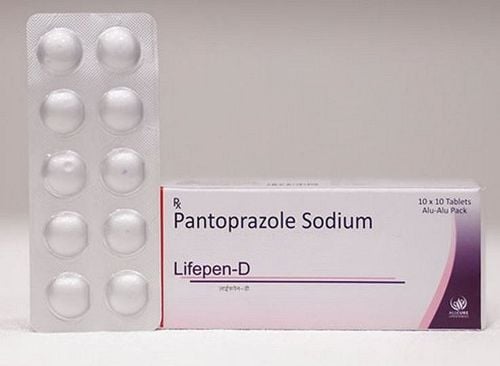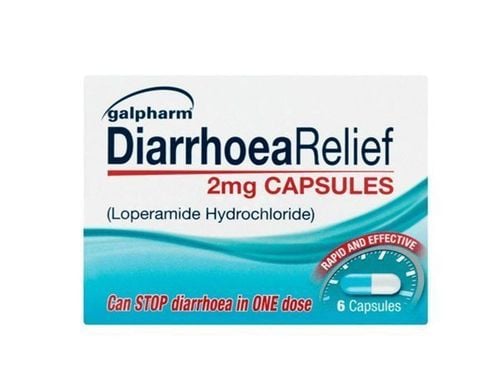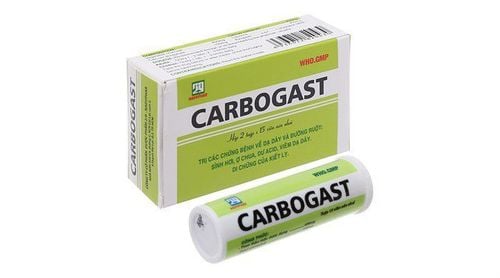This is an automatically translated article.
Many people wonder if Zegerid is good? What does Zegerid do? Zegerid is an antacid, anti-reflux and anti-ulcer medication that contains omeprazole and sodium bicarbonate as the active ingredients. Zegerid is widely used in the treatment of heartburn, belching, indigestion, flatulence...
1. What is Zegerid?
Zegerid is a combination of 2 ingredients Omeprazole and Sodium bicarbonate and is available in capsule and powder sachets. In which:
Omeprazole is a proton pump inhibitor that helps reduce the amount of acid that the stomach produces; Sodium bicarbonate is an antacid that raises the pH level in the stomach, which keeps Omeprazole from breaking down quickly in stomach acid. Since then, the drug Zegerid is recommended for use in the following cases:
Acid reflux; Stomach ulcers ; Prevent stomach bleeding.
2. Instructions on how to take Zegerid
How to use: Zegerid is used orally directly, usually 1-2 times / day on an empty stomach or at least 1 hour before meals.
Capsules: Swallow the tablet with 1 full glass of water (about 240ml) and it is best not to use other liquids such as tea, coffee, juice, etc. to take the medicine. Never split the capsule to sprinkle the powder on food. Powder package: Tear off the medicine package and put the powder into a glass with 15-30ml of cool water (do not use other water), then stir well and drink the mixture immediately. Note: Patients should not arbitrarily replace the powder and capsules with each other. Since these two dosage forms of Zegerid contain different amounts of sodium bicarbonate, the content is also different. Arbitrary replacement will cause the patient's body to face excess sodium, swelling hands or feet.
Dosage: The recommended dosage is based on the patient's medical condition. For children, the dose of Zegerid should be calculated based on weight. Below is the recommended adult dose:
Patients with duodenal ulcer: Take 20mg/day/time x 4 weeks. If the disease is not completely cured, continue taking it for another 4 weeks. Patients with gastric ulcer: Take 40mg/day/time x 4-8 weeks. Patients with gastroesophageal reflux: Take 20mg/day/time x 2-4 weeks. Patients with erosive esophagitis: Take 20mg/day/time x 4-8 weeks. For maintenance dose, 20mg/day/time for no more than 12 months. Patients with gastrointestinal bleeding: Oral suspension 40mg, after 6-8 hours take another 40mg within 14 days.
3. Side effects of the drug Zegerid
Zegerid may cause unwanted side effects during treatment with the drug. While most of these symptoms are not life-threatening, neglecting them can make them worse. Notify the doctor as soon as the patient has one of the following manifestations:
Stomach pain or diarrhea with fresh blood; Unusual pain in the wrists, back, hips and thighs; Nausea, vomiting, weight loss; Dizziness, absent-mindedness and convulsions; Numbness or tingling in the face and arms/legs; Kidney problems: Urinating little or no urine, blood in the urine, fluid retention in the body; Magnesium levels in the body drop to low levels, causing problems such as: Dizziness, fast heart rate, restlessness, cramps, muscle spasms in the arms and legs, choking; New or worsening symptoms of lupus erythematosus: Joint pain, rash on the skin, cheeks or arms; Prolonged use of Zegerid increases the risk of prostate polyps. If the drug is taken for more than 3 years, a vitamin B-12 deficiency may appear.
4. Notes when using Zengerid
Care should be taken when giving Zegerid to the following subjects:
Affected by sodium in the drug (such as congestive heart failure, high blood pressure, swelling...). Have kidney problems such as Bartter's syndrome. .. Liver disease (especially cirrhosis). Have calcium/potassium blood levels that are much lower than normal. Metabolic imbalance (eg, acid-base imbalance).
5. Interactions of the drug Zegerid
Possible interactions with Zegerid include:
Cilostazol Clopidogrel Memantine Methotrexate (in high doses) Rifampin Some medicines need stomach acid for the body to absorb them, but Zegerid's job is to do this. reduce stomach acid and thus make them less effective, including:
Atazanavir Erlotinib Nelfinavir Pazopanib Rilpivirine azole antifungals (Itraconazole, Ketoconazole, Posaconazole). Once you understand the use of Zegerid, patients should carefully read the instructions before using and consult a doctor for appropriate indications.
Please dial HOTLINE for more information or register for an appointment HERE. Download MyVinmec app to make appointments faster and to manage your bookings easily.













